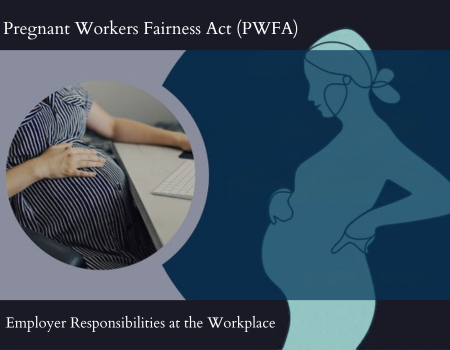New Pregnancy Protections Regulations in the Workplace for 2024! How Should Employers Comply?
Speaker: Margie Faulk, PHR, SHRM-CP
Speaker Designation: Compliance Advisor/E-Learning Instructor, HR Compliance solutions, LLC

Speaker: Margie Faulk, PHR, SHRM-CP
Speaker Designation: Compliance Advisor/E-Learning Instructor, HR Compliance solutions, LLC

On April 15, 2024, the EEOC issued its final regulation and interpretive guidance (“PWFA Regulations”) for the enforcement of the Pregnant Workers Fairness Act (“PWFA”), a law that took effect in June 2023. The PWFA supplements existing federal anti-discrimination law by requiring covered employers to provide reasonable accommodations to qualified employees or applicants with known limitations related to pregnancy, childbirth, or related medical conditions absent an undue hardship on the employer.
The U.S. Equal Employment Opportunity Commission’s (EEOC) final rule on the Pregnant Workers Fairness Act (PWFA) went into effect on June 18, 2024.
This rule provides additional protection for nearly 2.8 million pregnant workers each year, especially Black women and other women of color who are more likely to work during their pregnancy and live in states without pregnancy accommodation laws.
Pregnant Workers Fairness Act
The Fair Labor Standards Act (FLSA) requires employers to provide reasonable break time for an employee to express breast milk for their nursing child for one year after the child’s birth each time such employee needs to express the milk. Employees are entitled to a place to pump at work, other than a bathroom, that is shielded from view and free from intrusion from coworkers and the public.
Employers should review their handbooks and other policies to ensure that they are updated to comply with these changes. In addition, employers should educate their supervisors and managers about the changes in the law to help avoid inadvertent missteps in the future.
Failure to comply with the new pregnancy protection regulations can result in legal penalties, damage to the company's reputation, and a negative impact on employee morale and retention. By proactively addressing these changes, employers not only meet legal requirements but also demonstrate a commitment to supporting the well-being and equality of their workforce.
As societal awareness and legal frameworks around workplace equality continue to evolve, 2024 has seen the introduction of new regulations aimed at enhancing protections for pregnant employees. These regulations are designed to ensure that pregnant workers receive fair treatment, reasonable accommodations, and protection from discrimination and harassment. Understanding these new requirements is crucial for employers who must adapt their policies and practices to comply.

Margie Faulk is a senior-level human resources professional with over 18 years of workplace compliance experience and HR consulting experience—a current Compliance Advisor for HR Compliance Solutions, LLC. Margie has worked as an HR Compliance advisor for major corporations and small businesses in the small, large, private, public, and Non-profit sectors. Margie’s new focus is to provide Employers and Professionals with risk management strategies to develop risk management strategies to mitigate workplace violations.
Margie has provided small to large businesses with risk management strategies that protect companies and reduce potential workplace fines and penalties for violating employment regulations. Margie is bilingual (Spanish) fluent and Bi-cultural. Margie holds professional human resources certification (PHR) from the HR Certification Institution (HRCI) and SHRM-CP certification from the Society for Human Resources Management. Margie is a Society of Corporate Compliance & Ethics (SCCE) member. Margie is also a SHRM Credit Provider offering SHRM-CP and SHRM-SPC credits for her training which major HR individuals need to maintain their certification credits.
HR Compliance Solutions Offers HR Compliance E-Learning Training for Employers and Professionals in the form of E-Learning, Seminars, and Webinars. E-learning training focuses on workplace compliance, federal, state, and local regulations, Compliance Training for Managers and Leadership, employee handbook development, internal audits for I-9 Form Audit and Correction, policies & procedures, and current trending laws that are critical for ensuring an effective risk management strategy to reduce or eliminate fines, penalties and criminal sanction.
For more information about the impact of Workplace Compliance Regulations, please subscribe to my free compliance Newsletter https://lp.constantcontactpages.com/sl/NDs33Tm/FreeNewsletter